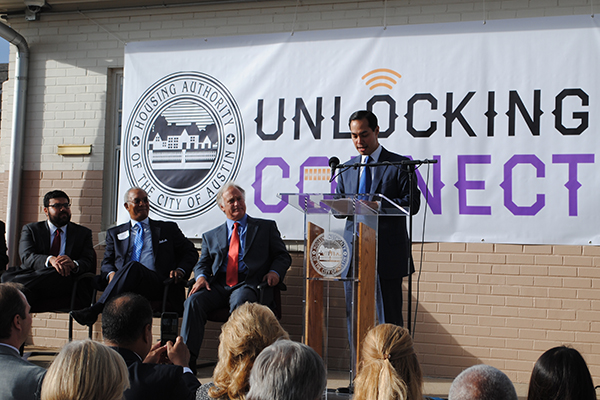“Closing the digital divide means that every child has a chance to succeed in the 21st century global economy,” said HUD Secretary Julián Castro. “This public-private collaboration means that more families will experience the benefits of broadband access. I commend The Housing Authority of the City of Austin, Google Fiber and key community partners for coming together to expand opportunity for others. Their work should serve as a model for other public housing agencies and businesses to follow across the country.”
Unlocking the Connection is a locally-driven, community-based effort to bring the benefits of the Internet to 4,300 public housing residents of all ages who reside in 18 HACA developments throughout Austin. Programming includes digital literacy and science, technology, engineering and mathematics (STEM) training, access to devices and the opportunity to access an affordable Internet connection.
“Public housing residents are in critical need of the connection, skills, knowledge and devices needed to access the meaningful, life-changing opportunities that technology brings,” said HACA President Michael Gerber. “Equitable access to technology can directly translate into workforce development, education, social inclusion, health and civic engagement opportunities for our residents.”
In January, HACA was awarded a 1-Gigabit Community Connections Site by the City of Austin’s Office of Telecommunications and Regulatory Affairs. In addition, city officials are in the process of developing an inaugural digital inclusion strategic plan, and were instrumental in facilitating discussions with potential sponsors.
Unlocking the Connection, led by Austin Pathways, a nonprofit organization that supports HACA programming, is focused on providing residents with a comprehensive set of training and resources that can address the multitude of underlying reasons why they might not be online today.
More than 20 community partners, including Google Fiber, have come together to provide support across these three areas. By providing support across training, devices, and Internet connections, Unlocking the Connection will offer the resources needed to connect HACA residents to the power of the Internet.
“I am very proud of HACA, Google Fiber, and all of the other partners for coming together to be innovators in helping residents move to self sufficiency,” said Sen. Kirk Watson. “Not only will this initiative provide residents with job and educational opportunities, it also has the potential to provide them with a link to other essentials like health and wellness resources.”
In any neighborhood that meets its signup goals for Google Fiber service, Google Fiber will build the fiber optic network infrastructure for serviceable HACA properties at no cost and provide an in-home Internet connection to HACA residents for free. Residents who sign up for Google Fiber’s Basic Internet Service will have a free connection for 10 years. They can also upgrade and pay for a gigabit connection at any time. Google Fiber is also providing support for devices and digital literacy training in HACA properties, including providing financial sponsorship to Austin Free-Net to deliver training to HACA residents of all ages.
“When we talk about the future of the Web, we talk a lot about the potential impact of gigabit speeds, but getting more families online can have just as significant an impact,” said Parisa Fatehi-Weeks, community impact manager of Google Fiber in Austin. “HACA is a natural partner to lead a long-term investment in digital inclusion that is truly unique to Austin — today was made possible because of the many local partners here who are committed to bringing more of the city’s residents online.”
The premier funding partners for Unlocking the Connection are the Ford Foundation and Open Society Foundations. Local sponsors are: IBM, 3M, Rackspace, Freescale and Austin Community College. Key service providers include: Austin Community College, Austin Free-Net, Skillpoint Alliance, Communities in Schools, Boys and Girls Club and Goodwill Industries. The University of Texas Moody College of Communication will serve as the initiative’s evaluation partner.

